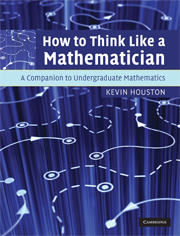Book contents
- Frontmatter
- Contents
- Preface
- I Study skills for mathematicians
- II How to think logically
- 6 Making a statement
- 7 Implications
- 8 Finer points concerning implications
- 9 Converse and equivalence
- 10 Quantifiers – For all and There exists
- 11 Complexity and negation of quantifiers
- 12 Examples and counterexamples
- 13 Summary of logic
- III Definitions, theorems and proofs
- IV Techniques of proof
- V Mathematics that all good mathematicians need
- VI Closing remarks
- Appendices
- Index
6 - Making a statement
from II - How to think logically
Published online by Cambridge University Press: 05 June 2012
- Frontmatter
- Contents
- Preface
- I Study skills for mathematicians
- II How to think logically
- 6 Making a statement
- 7 Implications
- 8 Finer points concerning implications
- 9 Converse and equivalence
- 10 Quantifiers – For all and There exists
- 11 Complexity and negation of quantifiers
- 12 Examples and counterexamples
- 13 Summary of logic
- III Definitions, theorems and proofs
- IV Techniques of proof
- V Mathematics that all good mathematicians need
- VI Closing remarks
- Appendices
- Index
Summary
When dealing with people, let us remember we are not dealing with creatures of logic. We are dealing with creatures of emotion, creatures bristling with prejudices and motivated by pride and vanity.
Dale Carnegie, How to Win Friends and Influence People, 1936When I tell people that I am a mathematician it is often not very long before they bring up the subject of how logical mathematics is. Sometimes they consider this a downside to the subject as it makes it so much harder. After all, with logic you have to be right whereas in other areas of life opinions matter more. And it's easy to have an opinion – even if you can't back it up with evidence.
Logic is in essence quite simple despite its reputation for difficulty. A small number of simple rules exist. We need only to apply these and reduce complicated statements with them to achieve success.
In the next few chapters we shall concentrate on the logic used by mathematicians in their day-to-day work rather than on deep conundrums and paradoxes or on technical material such as predicates, compound statements and so on. I will, however, explain truth tables, which are rarely used by mathematicians in their everyday work, as they do provide a lot of clarity for beginners.
Mathematics is the business of proving mathematical statements to be true or false. So, first let's look at statements.
Information
- Type
- Chapter
- Information
- How to Think Like a MathematicianA Companion to Undergraduate Mathematics, pp. 53 - 62Publisher: Cambridge University PressPrint publication year: 2009
